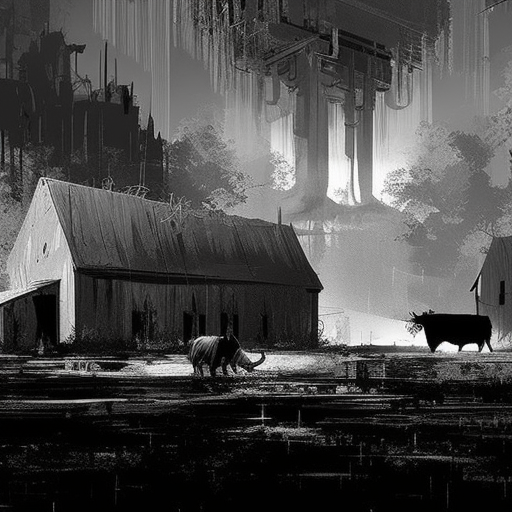Summary:
In George Orwell’s dystopian novels, “Animal Farm” and “1984,” he explores the dangers of totalitarianism and the corruption of power. In “Animal Farm,” a group of farm animals overthrow their human farmer, only to have the pigs, led by Napoleon, become just as oppressive as their human predecessors. In “1984,” Winston Smith lives in a society controlled by the Party, where Big Brother watches everyone’s every move. Both novels serve as cautionary tales, warning readers about the dangers of authoritarian rule and the manipulation of language and truth.
Animal Farm:
“Animal Farm” is a satirical allegory that tells the story of a group of farm animals who overthrow their human farmer in order to establish an egalitarian society. Inspired by the principles of Animalism, the animals work together to create a utopia where all animals are equal. However, as time goes on, the pigs, led by the power-hungry Napoleon, begin to manipulate and exploit the other animals for their own gain. They rewrite the commandments of Animalism to suit their needs, consolidate their power, and eventually become indistinguishable from the humans they once rebelled against.
The novel serves as a critique of the Russian Revolution and the rise of Joseph Stalin. Each character represents a figure from that time period, with Napoleon symbolizing Stalin and Snowball representing Leon Trotsky. Orwell highlights the corruption and hypocrisy of those in power, showing how even the most well-intentioned revolutions can be co-opted by individuals seeking personal gain.
1984:
“1984” is a dystopian novel set in a totalitarian society ruled by the Party, led by Big Brother. The protagonist, Winston Smith, works for the Party rewriting historical records to fit the Party’s propaganda. He begins to question the Party’s control and starts a forbidden love affair with Julia, a fellow Party member. As Winston rebels against the Party’s surveillance and oppression, he is eventually captured and subjected to intense psychological manipulation and torture.
The novel explores themes of government surveillance, thought control, and the manipulation of truth. Orwell introduces concepts such as Newspeak, a language designed to limit free thought, and the Thought Police, who punish individuals for having independent thinking. “1984” serves as a chilling warning about the dangers of totalitarianism and the erosion of individual freedom.
Key Takeaways:
- The corrupting influence of power: Both “Animal Farm” and “1984” illustrate how power can corrupt individuals and institutions, leading to oppression and the loss of freedom.
- The manipulation of language: Orwell emphasizes the importance of language and its manipulation by those in power. In both novels, the ruling class uses language to control and deceive the masses.
- The dangers of totalitarianism: Orwell’s novels serve as cautionary tales, warning readers about the dangers of living under a totalitarian regime where individuality and freedom are suppressed.
“All animals are equal, but some animals are more equal than others.” – Animal Farm
In conclusion, George Orwell’s “Animal Farm” and “1984” are powerful works of literature that explore the dangers of totalitarianism and the corruption of power. Through vivid storytelling and thought-provoking themes, Orwell reminds us of the importance of vigilance and the preservation of individual freedom. These novels serve as timeless reminders of the potential consequences of unchecked authority and the manipulation of truth.












